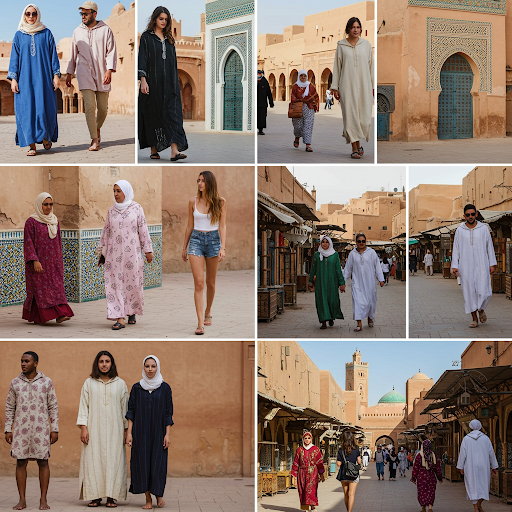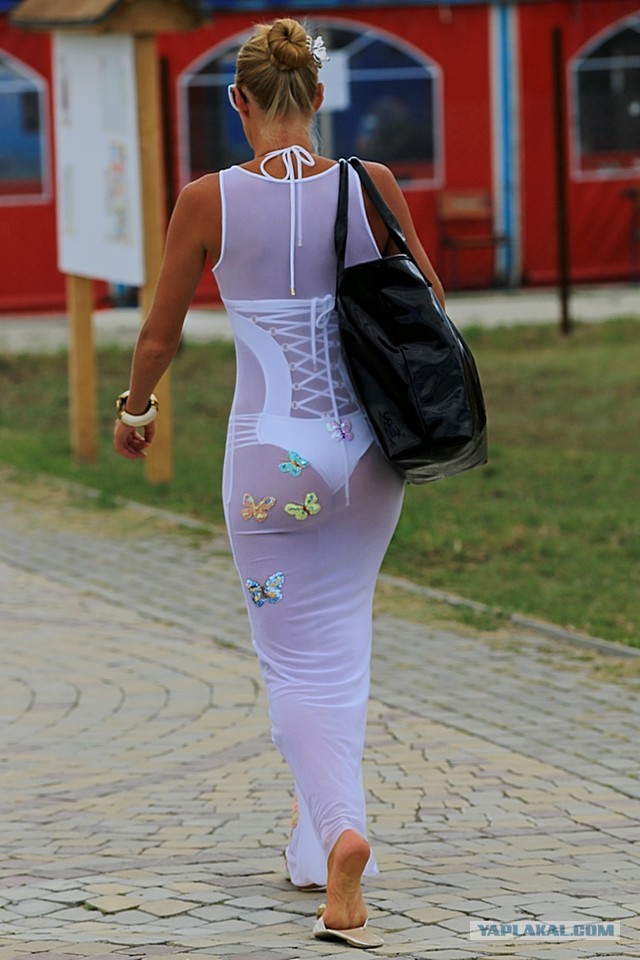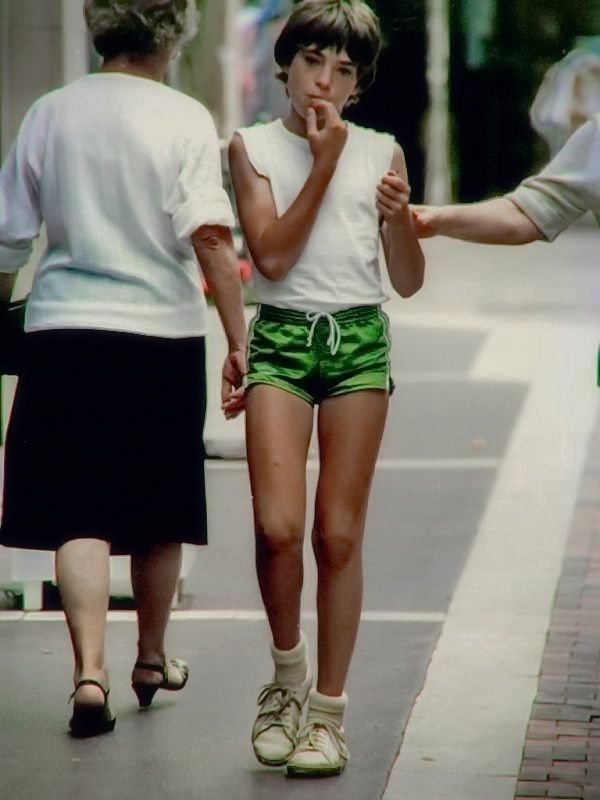Before packing for your trip, it’s essential to know what not to wear in Morocco. Morocco is a stunning blend of modern culture and deep-rooted traditions, and dressing appropriately shows respect for its people and customs. Choosing the wrong outfit not only draws unwanted attention but may also be considered disrespectful or uncomfortable in certain regions. This guide will walk you through everything you need to know about what not to wear in Morocco—so you can feel confident, respectful, and ready for every destination.
Why It Matters: Understanding What Not to Wear in Morocco

The Cultural Importance of Modest Dressing
One of the biggest tourist mistakes is underestimating how important modesty is in Morocco. What not to wear in Morocco includes anything revealing, overly tight, or disrespectful in traditional contexts. Even in major cities like Marrakech and Fes, modesty is appreciated.
First Impressions Matter
When you know what not to wear in Morocco, you avoid standing out for the wrong reasons. Dressing respectfully encourages positive interactions and helps you blend in with locals, especially in conservative or rural areas.
What Not to Wear in Morocco as a Woman

Inappropriate Tops and Dresses

- Strapless tops, crop tops, and plunging necklines fall under what not to wear in Morocco.
- Avoid sleeveless tops unless paired with a scarf or jacket.
Shorts and Skimpy Skirts

While popular in Western countries, shorts and mini skirts are definitely what not to wear in Morocco, particularly outside beach resorts.
Transparent or Tight Clothing

Clothing that clings to your body or reveals undergarments is a major part of what not to wear in Morocco. Loose, breathable clothing is always the better option.
What Not to Wear in Morocco as a Man
Tank Tops and Sleeveless Shirts
Men should also be cautious. Tank tops and sleeveless shirts are examples of what not to wear in Morocco, especially in rural or religious settings.
Shorts in Traditional Settings

While you may see locals in shorts on the beach, wearing shorts in medinas or villages is still seen as inappropriate. Another key item of what not to wear in Morocco.
Overly Flashy or Branded Clothing
Loud fashion or obvious luxury branding can signal wealth—something to avoid when considering what not to wear in Morocco if you want to avoid attention or scams.
Specific Situations: What Not to Wear in Morocco
At Mosques or Religious Sites

Absolutely high on the list of what not to wear in Morocco—short sleeves, bare legs, and uncovered heads (for women) are inappropriate. Always dress modestly and remove shoes before entering.
In Rural Villages or Mountains
Tourist hubs are more relaxed, but rural areas are not. Here’s what not to wear in Morocco in these regions:
- Shorts
- Revealing tops
- Body-hugging outfits
At the Beach or Desert Camps
Even though these locations are more relaxed, what not to wear in Morocco still applies:
- Avoid thong bikinis or topless sunbathing
- Cover up when walking to and from beach areas
What Not to Wear in Morocco for Weather Comfort

Fabrics That Trap Heat
When considering what not to wear in Morocco, especially during the warmer months, avoid synthetic fabrics like polyester or nylon. These materials don’t breathe well and can make you overheat in the intense Moroccan sun. Stick with lightweight cotton, linen, or moisture-wicking blends instead.
Sandals or Flip-Flops in Cities
While they seem convenient, flip-flops fall under what not to wear in Morocco when exploring urban areas. The streets can be uneven, dusty, and crowded. Closed-toe shoes or supportive sandals are more practical and safer.
Layering Mistakes
Another entry under what not to wear in Morocco includes neglecting layers. Moroccan weather can change quickly between day and night, especially in the mountains and desert. Failing to pack a light jacket or long sleeves can leave you uncomfortable or underdressed in cooler climates.
Fashion Faux Pas: What Not to Wear in Morocco for Style and Safety
Clothes That Attract Too Much Attention
Bright neon colors, graphic slogans, and flashy outfits are examples of what not to wear in Morocco if your goal is respectful, discreet travel. Dressing loudly can make you a target for unwanted attention or overpricing in local markets.
Items That Signal Wealth or Invite Scams
Expensive jewelry, branded designer bags, and high-end gadgets should also be added to the list of what not to wear in Morocco—or rather, what not to display. These items can draw the attention of pickpockets or scammers.
Ill-Fitting or Travel-Inappropriate Outfits
Another aspect of what not to wear in Morocco is impractical clothing. Think high heels, tight jeans in desert heat, or delicate fabrics that wrinkle or stain easily. Travel requires durability and versatility, not fashion risks.
What Not to Wear in Morocco During Ramadan or Festivals
Dressing Respectfully During Holy Months
During Ramadan, it’s especially important to be mindful of what not to wear in Morocco. Avoid clothing that reveals skin, even if it’s accepted in more touristy areas during other times of the year.
Avoiding Insensitive Fashion Choices
T-shirts with alcohol branding, offensive graphics, or culturally inappropriate messages are definitely on the list of what not to wear in Morocco, particularly during religious festivals or in spiritual spaces.
What to Wear Instead: Smart Substitutes
Modest Yet Stylish Outfits
Instead of wondering what not to wear in Morocco, focus on what works:
- Loose maxi dresses or skirts
- Breathable long-sleeved tops
- Trousers or harem pants that are cool and comfy
Versatile Layers and Light Fabrics
Light cardigans, scarves, and shawls are essential alternatives to what not to wear in Morocco. They can easily cover shoulders or legs when needed without making you overheat.
Shoes That Work Everywhere
Closed-toe walking shoes, sturdy sandals, and lightweight boots are the best options. They’ll keep your feet clean, safe, and stylish—unlike some examples of what not to wear in Morocco (flip-flops or heels).
FAQs About What Not to Wear in Morocco
Is it illegal to wear shorts in Morocco?
No, it’s not illegal, but shorts are still considered what not to wear in Morocco in most traditional areas. Longer pants are more respectful and appropriate.
Can I wear leggings in Morocco?
Only if worn under a tunic or long top. On their own, leggings are typically viewed as what not to wear in Morocco, especially in conservative cities.
What should kids not wear in Morocco?
Children should also avoid overly revealing or tight clothing. Sleeveless tops and very short shorts fall under what not to wear in Morocco, even for young travelers.
Can I wear jewelry or makeup?
Simple makeup is fine, but flashy jewelry should be avoided. It may fall under what not to wear in Morocco due to safety concerns and unwanted attention.
How do locals view tourist fashion?
Locals are used to tourists, but dressing modestly is still a sign of respect. Knowing what not to wear in Morocco helps you avoid offending anyone or standing out too much.
Conclusion – Be Respectful, Be Comfortable: What Not to Wear in Morocco
Understanding what not to wear in Morocco isn’t about restricting your style—it’s about traveling smart and respectfully. Choosing culturally appropriate, comfortable, and versatile clothing ensures you enjoy everything Morocco has to offer while making a great impression on the people you meet.
Avoiding tourist fashion mistakes not only keeps you safe but also enhances your overall travel experience. So pack mindfully, dress modestly, and remember—what not to wear in Morocco can be just as important as what to bring.
By JobHijra

